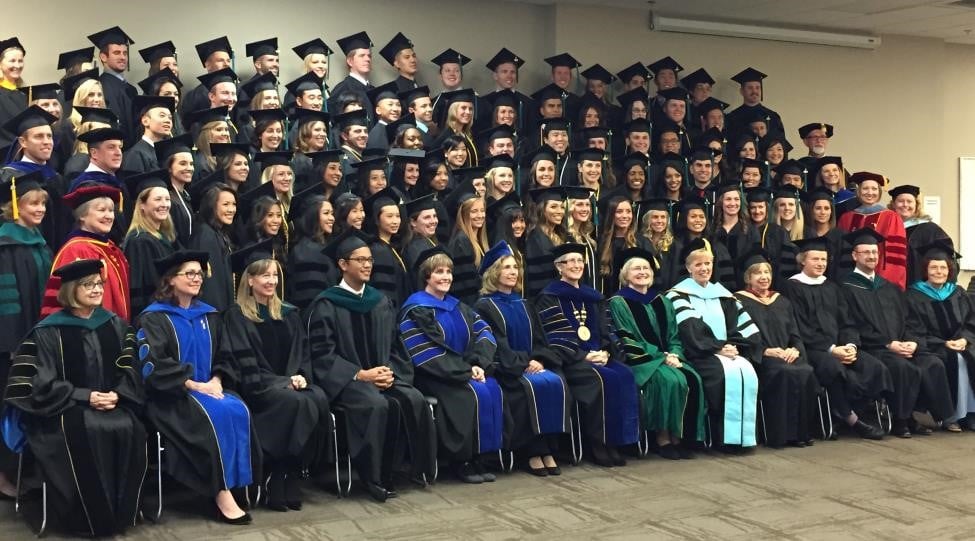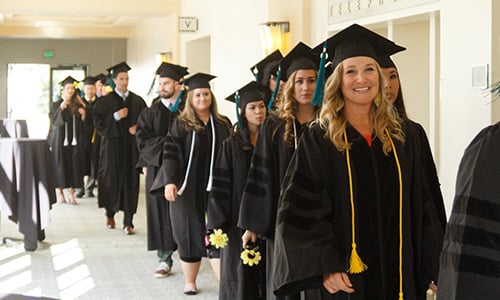
What is an FNP? A family nurse practitioner (FNP) is an advanced practice registered nurse who focuses their specialty training on caring for patients of all ages, from infants to adults to seniors.
The FNP nurse role specialty is highly desirable among nurse practitioners (NPs) as it’s one of the most rewarding careers in healthcare. The American Association of Nurse Practitioners (AANP) reports that there are more than 355,000 licensed NPs in the United States, and more than 65% specialize in family care.1
If you want to pursue a degree to become an FNP nurse practitioner, continue reading to discover everything you should know about the FNP role, salary prospects, career outlook and the steps required to become one.
What is an FNP vs. NP: The Difference
What is an FNP’s scope of expertise compared to a standard NP? FNPs have specialized training and expertise in family practice, whereas other NPs may specialize in different areas of healthcare.
Nurse practitioners are registered nurses (RNs) who have earned at least a master’s degree to advance the scope of their knowledge and practice.
During their master’s-level coursework, nurses choose a role specialty, such as family medicine nurse practitioner, pediatrics, women’s health or psychiatric mental health nurse practitioner (PMHNP), among others.
What Does a Family Nurse Practitioner Do?
What is FNP training designed to prepare nurses for? Family nurse practitioners work with patients of all ages in various healthcare settings, such as hospital outpatient clinics, private physician practices and private group practices. They play a crucial role in delivering primary care services to patients, often serving as the primary healthcare provider for many individuals and families.
FNP Responsibilities
What is a family nurse practitioner responsible for? Though exact tasks vary by state, family nurse practitioners juggle a broad spectrum of responsibilities, including:2
- Administer medication and vaccines
- Diagnose illnesses
- Order and perform screening and diagnostic medical tests
- Analyze test results
- Manage care plans
- Provide patient education
Scope of Practice
Even as a specialized NP, the scope of practice varies depending on the state. Some states and U.S. territories grant NPs, including FNPs, full practice authority, which allows them to practice independently without physician oversight. In other states, NPs are obligated to practice in collaboration with or under the supervision of a physician.3


FNP Nurse Role: Work with Patients From Infancy Through Adulthood
What is an FNP used for in healthcare settings? With a potential patient group that ranges from babies and children to teens, adults and seniors, the daily workload of an FNP can vary greatly, depending on an individual’s needs.
It’s not uncommon for a family medicine nurse practitioner to begin seeing a patient during childhood and continue as their medical provider into adulthood. This allows the FNP to track the patient’s health and well-being and build a relationship over time—likely more effectively than they could in other nursing scenarios.
What is an FNP Average Salary and Career Outlook?
According to the U.S. Bureau of Labor Statistics (BLS), the average annual salary for all NPs was $128,490 as of May 2023.4 Salaries can vary, however, depending on location and the patient care setting.
The career outlook for nurse practitioners is promising. The profession is projected to experience a 46.3% growth rate between 2023 and 2033, positioning it as one of the top three fastest-growing occupations in the U.S. over the next decade.5,6


How to Become a Family Nurse Practitioner
What is an FNP’s path to a rewarding and sustainable career? Complete a Bachelor of Science in Nursing (BSN) program, pass the National Council Licensure Examination for Registered Nurses (NCLEX-RN) exam, earn a graduate nursing degree and pass the national FNP certification exam.2 See below for more details on how to become a certified FNP nurse practitioner.
1. Earn a BSN (or RN)
The first step to becoming an FNP is often to earn a BSN at an accredited college or university. This degree provides you with a solid foundation in nursing knowledge and skills, and then you can pursue a BSN-entry through a program like the online BSN to MSN degree program at USAHS.
Some RNs can also earn an associate degree in nursing (ADN). With programs like the online RN to MSN degree program at USAHS, you can enroll directly into an MSN program after earning your ADN from an accredited program and completing one year as a full-time RN.*
2. Get your Registered Nurse License
What is an FNP’s next step following the completion of a BSN? Next, pass the NCLEX to become a licensed registered nurse. Check the requirements of the nursing board in the state where you plan to practice, as licensing requirements can vary.
While working as an RN, you’ll gain valuable experience in a clinical setting, such as a hospital, clinic or other healthcare facility. This experience helps develop your nursing skills and will expose you to diverse patient populations, a helpful step for when you apply to a graduate program.


3. Earn a Graduate Nursing Degree
To become a family medicine nurse practitioner, pursue an advanced nursing degree with a role specialty in family practice, such as:
- Master of Science in Nursing–Family Nurse Practitioner (MSN-FNP)
- Doctor of Nursing Practice–Family Nurse Practitioner (DNP-FNP)
What is a family nurse practitioner’s average timeline for earning their advanced degree? The MSN or DNP programs typically take two to four years to complete at the University of St. Augustine for Health Sciences (USAHS).**
4. Complete the National FNP Certification Process
After completing your graduate program, pass the national FNP certification exam, which will test your knowledge of family medicine, including conditions, treatments, medications and more.
What is a family nurse practitioner’s option for certification? The AANP provides detailed information about this. For the FNP nurse practitioner specialty, you can become certified through either of the following organizations:7
- The American Academy of Nurse Practitioners Certification Board (AANPCB)8
- The American Nurses Credentialing Center (ANCC) Certification Program9
Check out the practice information about obtaining licensure in your state.10
Additional optional certifications are available for FNPs who want to further specialize in diabetes, pain or obesity management.
Ready to Pursue a Career as an FNP Nurse?
FNPs play a vital role in delivering comprehensive healthcare to individuals and families. With their broad scope of practice and the increasing demand for nurse practitioners, FNPs have excellent career prospects.
If you’re passionate about making a difference in people’s lives and aspire to become an FNP nurse, consider exploring the various graduate nursing programs offered by USAHS, where you’ll learn from expert clinicians and educators within a supportive community of like-minded nursing students.
The University of St. Augustine for Health Sciences (USAHS) offers a Master of Science in Nursing (MSN), a Doctor of Nursing Practice (DNP) and Post-Graduate Nursing Certificates designed for working nurses. Our degrees are offered online, with optional on-campus immersions.*** Role specialties include Family Nurse Practitioner (FNP), Psychiatric Mental Health Nurse Practitioner (PMHNP)**** and Nurse Executive. The MSN and DNP have options to accelerate your time to degree completion. Earn your advanced nursing degree while keeping your work and life in balance.
*The RN-MSN (FNP and PMHNP) degree program is designed specifically for registered nurses with an associate degree in nursing, an active unencumbered RN license, and one year of full-time experience as an RN.
**Time to completion may vary by student, depending on individual progress, traditional vs. accelerated pathway, credits transferred and other factors.
***The FNP role specialty includes one required hands-on clinical intensive as part of the curriculum.
****The Psychiatric Mental Health Nurse Practitioner role specialty is not available for the DNP program.
Salary data may not reflect starting pay for recent graduates.
Sources:
- AANP “Nurse Practitioners in Primary Care,” AANP, last modified May 2022, https://www.aanp.org/advocacy/advocacy-resource/position-statements/nurse-practitioners-in-primary-care.
- Deering, M., “Family Nurse Practitioner (FNP) Career Overview,” NurseJournal, October 2, 2023, https://nursejournal.org/nurse-practitioner/fnp/.
- American Association of Nurse Practitioners, “State Practice Environment,” AANP, last modified October 2024, https://www.aanp.org/advocacy/state/state-practice-environment.
- U.S. Bureau of Labor Statistics, “Occupational Employment and Wages, May 2023, Nurse Practitioners,” BLS, last modified April 3, 2024, https://www.bls.gov/oes/current/oes291171.htm#nat.
- U.S. Bureau of Labor Statistics, “Employment Projections, Nurse Practitioners,” BLS, accessed January 2025, https://data.bls.gov/projections/nationalMatrix?queryParams=29-1171&ioType=o.
- U.S. Bureau of Labor Statistics, “Fastest Growing Occupations”BLS, last modified August 29, 2024, https://www.bls.gov/ooh/fastest-growing.htm.
- American Association of Nursing Practice “Nurse Practitioner (NP) Certification,” AANP, accessed January 2025, https://www.aanp.org/student-resources-old/np-certification.
- American Academy of Nurse Practitioners Certification Board, “American of Academy Nurse Practitioners Certification Board,” AANPCERT, last modified 2024, https://www.aanpcert.org/.
- American Nurses Credentialing Center, “Our Certifications,” NursingWorld, accessed January 2025, https://www.nursingworld.org/our-certifications/.
- American Association of Nurse Practitioners, “Practice Information by State,” AANP, accessed January 2025, https://www.aanp.org/practice/practice-information-by-state.








